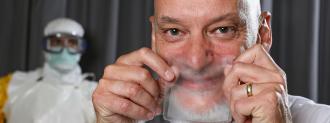Two years ago, a team of Swiss scientists set out to build a better surgical mask, one that would allow patients to see healthcare workers’ faces while still providing the workers with comfortable protection from pathogens.
Now, with demand for masks surging in response to the coronavirus pandemic, the scientists are ready to begin mass producing their see-through face mask, with the goal of having it on healthcare workers’ faces early next year.
A See-Through Face Mask
The see-through face mask is a collaboration between two Swiss research institutes — the Swiss Federal Institute of Technology in Lausanne (EPFL) and the Swiss Federal Laboratories for Materials Science and Technology (EMPA).
The groundwork for it began in 2015, when Klaus Schönenberger, the head of the EPFL’s EssentialTech Center, went to Africa to help battle the Ebola outbreak.
A smile and a look can often speak more powerfully than words.
Thierry Pelet
“It was touching to see that nurses — covered from head to toe in protective gear — pinned photos of themselves on their chests so that patients could see their faces,” Schönenberger said of the experience in a news release.
Separately, EPFL project managers Sacha Sidjanski and Thierry Pelet learned of the plight of Diane Baatard, a woman who was dismayed that seriously ill children at Geneva University Hospitals couldn’t see her facial expressions through her mask as she read to them.
In 2016, the pair approached Schönenberger with a design for a see-through face mask. That meeting led to the creation of the trio’s startup and their HelloMask.
Reinventing the Surgical Mask
While the HelloMask isn’t the first example of a see-through face mask, it has some huge advantages over other designs, which are often little more than a standard surgical mask with a section removed and replaced with clear plastic.
While those masks do protect healthcare workers from pathogens, wearing one can make it difficult to breathe. The plastic can also fog up, obscuring a workers’ face nearly as much as a standard surgical mask would.
There’s also the added issue of the disposable masks contributing to the world’s already massive plastic waste problem.
To create a see-through face mask without those shortcomings, the Swiss scientists eschewed the standard material — plastic — in favor of one they created themselves using a technique called “electrospinning,” which uses electric forces to create thin polymer fibers.
In the finished material, the polymer fibers are just 100 nanometers apart from one another — that’s the same distance as the threads in a conventional surgical mask, meaning the Swiss team’s see-through face mask is just as breathable and protective as its cloth counterpart.
Transparency isn’t the HelloMask’s only advantage over the standard surgical mask, either.
“Our material is made (…) 99% from a biomass derivative,” Pelet said in the news release, “and we’ll keep working on them until they’re completely eco-friendly.”
According to Pelet, the current demand for face masks due to the coronavirus pandemic made it easy for the startup to secure its first round of funding, raising more than $1 million.
The startup is now shifting its focus to mass producing HelloMasks, with the goal of having the see-through face mask ready to sell to healthcare workers in early 2021 — and potentially, for long after the COVID-19 pandemic is over.
“Empathy and trust are proven to have a positive impact on a patient’s wellbeing and recovery,” Pelet said in a press release. “A smile and a look can often speak more powerfully than words. HelloMask makes that possible.”
We’d love to hear from you! If you have a comment about this article or if you have a tip for a future Freethink story, please email us at tips@freethink.com.






